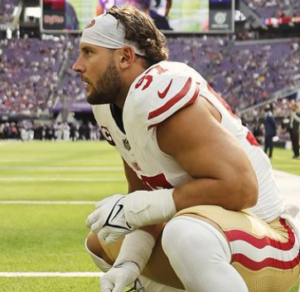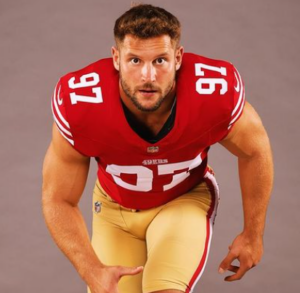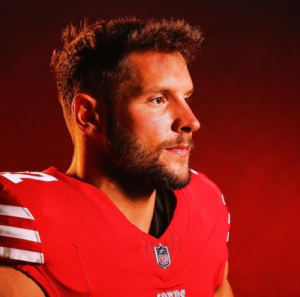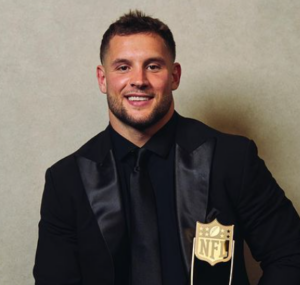Nick Bosa’s post-game MAGA hat display may be a turning point for the NFL’s stance on political expression
While the league’s silence leaves many questions unanswered, the incident underscores the tensions between personal beliefs and league policies.
This moment serves as a reminder of the growing role that politics plays in modern sports and the challenges that leagues face in adapting to an ever-evolving cultural landscape.
Nick Bosa’s MAGA hat controversy has reignited the conversation about the responsibility that comes with political expression in sports.
While Jemele Hill and Quincy Avery have criticized Bosa’s lack of transparency, this incident serves as a broader reflection of society’s demand for accountability from public figures.
Whether or not Bosa chooses to clarify his views, this situation has added to the ongoing debate about the role of athletes in political discourse and the expectations placed upon them.

Also Read: Who is Nick Bosa Girlfriend Jenna Berman? Break-Up, Career, Net Worth 2023, TikTok & More
Table of Contents
Nick Bosa’s Controversial MAGA Hat Moment
The Fallout and NFL’s Stance
On October 27, the San Francisco 49ers emerged victorious over the Dallas Cowboys, but defensive lineman Nick Bosa’s post-game celebration caused quite a stir.1
In an unscripted moment, Bosa interrupted an NBC interview with teammates Brock Purdy, Isaac Guerendo, and George Kittle, flaunting a “Make America Great Again” (MAGA) cap in front of the camera.
With NFL rules prohibiting unapproved political statements, fans and analysts expected swift disciplinary action.
However, weeks later, there’s still no official response. Here’s a look at what happened, the potential fallout, and the NFL’s past actions on similar incidents.
Nfl says they care about player safety yet they can’t put us on a natural surface #saferfields
— Nick Bosa (@nbsmallerbear) November 12, 2022
The Incident: Bosa’s MAGA Hat Display
After their win against the Cowboys, Bosa made his way to a live NBC broadcast featuring his teammates. As the interview unfolded, Bosa walked up behind Purdy, made sure the camera was on him, and held up a MAGA cap before walking away.
The incident quickly went viral, with fans and critics alike speculating on the potential consequences.
The NFL is stringent about its uniform and conduct policies, particularly when it comes to unsanctioned messages or symbols.
The display of political slogans or logos—especially those not cleared by the league—is typically met with penalties, often in the form of fines.
With Bosa’s clear display of a politically charged symbol on national TV, questions began to swirl: Would the NFL impose a fine? And if so, how severe would it be?
NFL’s Stance on Political Statements: A History of Enforcement
The NFL has a track record of discouraging overtly political or divisive statements from players on the field or during official broadcasts.
Past incidents have demonstrated that the league prioritizes uniformity and attempts to keep political endorsements out of its broadcasts. The league’s regulations on uniformity extend to logos, slogans, and even custom designs that haven’t received league approval.
Typically, violations of these policies incur fines, which can range from a few thousand dollars to as much as $11,000 for first offenses. Repeated violations can lead to even higher fines or additional disciplinary measures.
For example, when former players like DeAngelo Williams and William Gay attempted to raise awareness for breast cancer and domestic violence, they received fines for their unauthorized gear, despite the causes being non-partisan and widely supported.
Thus, Bosa’s MAGA cap was expected to draw an immediate response from the NFL given the history of swift action on similar issues.

Nick Bosa’s Perspective: No Regrets, No Reversal
Shortly after the incident, reporters caught up with Bosa in the locker room to discuss the potential repercussions. When asked about the possibility of being fined, Bosa was candid.2
He mentioned that he hadn’t received a notice from the league yet but expressed little concern over the potential financial consequence. “Yeah.
It was well worth it,” he said when pressed on the topic. He further stated that he had no regrets about expressing his support for former President Donald Trump, adding, “I don’t think my position on speaking about it is going to change. So clearly, the nation spoke, and we got what we got.”
Bosa has been vocal about his political leanings in the past, supporting Trump during his initial campaign. His support for the former President, now President-elect, is well known, especially among NFL fans who follow his off-field activities.
For Bosa, it seems the opportunity to promote his views during a nationally televised segment was worth the risk of a potential fine, a sentiment he has not backed down from.
The NFL’s Silence: Delayed Action or Intentional Overlook?
Following Bosa’s incident, many expected the NFL to swiftly issue a fine, as it has in similar situations. Yet, as of now, the league has taken no public action. The Athletic reportedly reached out to the NFL for clarification but did not receive a response. This silence has led to speculation.
Could the NFL be reconsidering its position on political statements in light of the current political climate? Or is the league’s delayed response an indication that it might quietly move past the incident without formal discipline?
While the NFL generally adheres to strict policies about political neutrality, this incident brings into focus the challenges of balancing free expression with league image. Bosa’s MAGA hat display has ignited a conversation on the role of personal beliefs within the sport and whether the league should maintain its apolitical stance.
Kelly Stafford’s Take on Team Politics
Amidst the NFL’s silence on Bosa’s actions, Matthew Stafford’s wife, Kelly, has also recently shared her perspective on how politics can affect team dynamics.
While unrelated to Bosa’s incident, Kelly Stafford discussed her own anxieties regarding her husband’s future with the Los Angeles Rams amid rumors of a potential trade to the Minnesota Vikings. She voiced her concerns over how such rumors affect her family and acknowledged the pressures athletes face both on and off the field.
Kelly Stafford’s comments highlight how even rumors and personal beliefs can weigh heavily on players and their families. Her willingness to speak out about the personal challenges tied to an NFL career draws a parallel to the broader issue of how political affiliations and media narratives can impact players.

Nick Bosa: NFL Players and Political Expression
The Balance Between Personal Beliefs and League Policies
Bosa’s actions once again spotlight the broader question of political expression in sports.3
Athletes, like all individuals, hold personal beliefs, and there’s an increasing demand from some fans for athletes to be vocal on social issues.
Yet, professional leagues like the NFL often struggle to balance these personal expressions with policies aimed at maintaining neutrality.
In recent years, some leagues have adapted, offering platforms for players to voice their beliefs in controlled environments.
However, there’s an ongoing debate about whether players should use high-profile games and media appearances to endorse political figures or causes. Critics argue that such actions can alienate fans who hold different views, while supporters claim that athletes have a right to express themselves, especially on issues they’re passionate about.
Potential Consequences for Bosa and the NFL’s Next Move
Should the NFL choose to fine Bosa, it would reinforce its longstanding position against unauthorized political endorsements.
The league has often prioritized uniformity in player representation to avoid divisive narratives within broadcasts.
However, the longer the league remains silent, the more it fuels speculation that this incident might be handled differently from past infractions.
If a fine is ultimately issued, it will likely spark further conversations around the role of political expression in the NFL and other professional sports.
Moreover, the league’s decision could set a new precedent for handling similar cases in the future, whether that means stricter enforcement or a potential shift toward allowing greater latitude for personal expression.
The Bigger Picture: Politics and the NFL’s Public Image
Bosa’s display, while brief, brings to light the complexities of navigating political expression within the NFL. In the current climate, where public figures are often expected to take a stance, professional sports organizations face increasing pressure to allow personal expression.
However, with an enormous fan base and media presence, the NFL is cautious about alienating audiences. As a result, the league often seeks to maintain an apolitical stance, emphasizing uniform policies for player conduct and branding.
Bosa’s decision to wear a MAGA hat on national television has introduced a new chapter in the ongoing conversation about personal beliefs in professional sports.
The NFL’s handling of this case will likely shape future policies on political endorsements and provide insight into how the league balances individual freedoms with its commitment to neutrality.

Also Read: Graham Mertz: Is He Ready for the NFL? Examining the Florida QB’s Path to the Pros and Promotion
Nick Bosa: Quincy Avery’s Sharp Critique of His Actions
It wasn’t only Jemele Hill who found Bosa’s actions problematic. QB Takeover coach Quincy Avery also chimed in, condemning Bosa for what he saw as a lack of integrity in making a bold statement without standing behind it.
Avery described Bosa as a “weak a** dude,” suggesting that if Bosa had strong convictions about his political beliefs, he would have the courage to discuss them openly.
Avery’s critique reflects a broader expectation for public figures to be transparent about their political allegiances, especially when they choose to make those views known in public settings.
By wearing the MAGA hat without elaboration, Bosa’s actions appear performative rather than genuine, which has frustrated fans and critics who expect more from their sports heroes.
Why Political Statements in Sports Are a Hot-Button Issue
The backlash surrounding Nick Bosa is just one example of a larger debate about politics in sports. As public figures with significant influence, athletes have the power to inspire, unite, or divide their fans based on the messages they send.
When athletes wear clothing or display symbols tied to specific ideologies, it often raises questions about their beliefs, leading fans and the media to demand explanations.
Historically, political statements in sports have generated mixed reactions, with some fans appreciating athletes’ authenticity and others feeling uncomfortable with political messages infiltrating the sports world.
Some argue that athletes should refrain from making political statements to maintain neutrality, while others believe that they have a responsibility to use their platforms for social good.

Nick Bosa: Polarizing Symbol in Sports
The MAGA hat has become one of the most polarizing symbols in recent American history, often associated with Trump’s platform and conservative values.
When Nick Bosa decided to wear it during a teammate’s interview, he effectively made a political statement that many saw as an endorsement of Trump’s ideologies. Given Bosa’s position as an influential NFL player, this silent gesture did not go unnoticed.
Fans and critics alike have since questioned whether Bosa was trying to make a point or merely express a personal preference.
For some, the hat represents more than just political support—it signifies a broader set of beliefs about race, immigration, and equality, all issues that have deeply divided the American public.
Nick Bosa: Paid Partnership
Nice Bosa tied up in a paid partnership with SKIMS for their new Men launches and promoted on his instagram account.
View this post on Instagram
The Role of Athletes in Political Discourse
Athletes have historically played a significant role in political discourse, from Muhammad Ali’s stand against the Vietnam War to Colin Kaepernick’s protest against police brutality.
Today’s athletes often navigate a world where politics and sports intersect, and they are expected to use their platforms responsibly.
While some athletes embrace this responsibility and engage in activism, others, like Nick Bosa, seem hesitant to clarify their stance.
For some fans, this silence comes across as an unwillingness to face the potential repercussions of taking a strong position.
When athletes choose to express political opinions, their decisions can impact not only their image but also the brands they represent, the teams they play for, and the fans who support them.
Also Read: Unveiling Lauren Maenner’s Personal Story: Family, Background, and More




